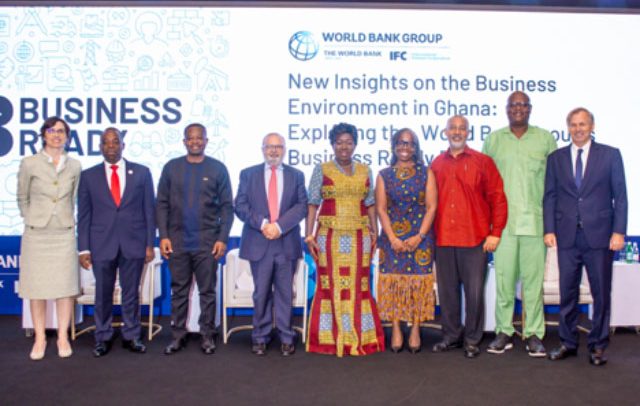Stakeholders with some officials of World Bank
Ghana has scored 68.6% in labour market regulations and 68.5% in utility service outpacing much of Sub-Saharan peers, the 2024 Business Ready (B-Ready) report published by the World Bank Group, has revealed.
According to the report, under labour market regulations, Ghana performed well under rights clarity, dispute resolution, and fairness ahead of countries such as Gambia that recorded 49.21%, Rwanda, 60.15% and Sierra Leone, 60.54%.
On utility services, Ghana scored 68.5% ranking well above Côte d’Ivoire 58.9%, Rwanda 67.8% and Togo 64.0%, in the areas of transparent tariffs and strong safety oversight contributing to investor confidence closing the gap with Tanzania that recorded 78.8%.
The report also scored 64.9% for Ghana in Business Insolvency Framework providing clear pathways for firms facing financial distress crucial for predictability and responsible risk-taking
The B-Ready report published by the World Bank Group assessed the global business climate including Ghana’s performance and also provided a comprehensive assessment of business regulations, market competition, access to finance, labour dynamics and the ease of doing business among others.
The report, however, revealed that despite the country performing well, other areas including business entry, market competition, dispute resolution, tax compliance, digital infrastructure still faces significant challenges if unaddressed, will continue to stifle business growth and deter investment.
Robert Taliercio, World Bank Division Director for Ghana, Sierra Leone and Liberia in a speech during the launch of the report said in many areas, Ghana has the regulatory framework and public services and infrastructure to deliver a competitive business environment, but operational efficiency has lagged because of limited implementation, particularly on digitalization and inter-agency coordination.
He said the World Bank’s Business Ready (B-READY), report is not just another macro stability scorecard but a diagnostic tool that sheds light on areas where Ghana is already showing commendable progress and points out where targeted reforms could unlock the country’s full economic potential.
He therefore recommended financial and technical assistance, public private dialogue and regional learning to facilitate exchanges that will allow Ghana to benefit from the successes of high-performing peers like Rwanda and Côte d’Ivoire, while sharing Ghana’s own successes where it leads.
“Ghana has long played a leadership role in the region. By seizing the opportunities highlighted by B-READY and addressing the bottlenecks head-on, Ghana can set a benchmark for a resilient, inclusive, and globally competitive economy,” he said.
By Ebenezer K. Amponsah


